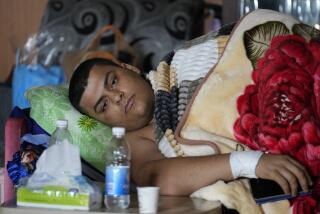Blasts in Iraq leave at least 31 dead
- Share via
BAGHDAD — One minute, Salam Munim was waiting patiently among a crowd of recruits, eager to join the Iraqi army’s next major offensive against Sunni Arab insurgents in his home province of Diyala. The next, he said, he was engulfed in a “hellish vision” of blood, smoke and dust.
Munim was among those wounded Tuesday morning when two bombers blew themselves up minutes apart among recruits at a U.S.-Iraqi army base in the eastern suburbs of Baqubah, killing 27 people and injuring 68, Iraqi security officials said. The U.S. military put the toll at 20 dead and 55 wounded. The reason for the discrepancy was not immediately clear.
Bombings in the northern city of Mosul and in Baghdad claimed at least 11 more lives, underscoring the persistent threat posed by Sunni Arab insurgents as violence drops nationwide.
A member of the Diyala province security operations command said Sunni and Shiite Muslim tribal leaders had been asked to send recruits to join a new offensive against insurgents who have terrorized the eastern Iraqi province. He spoke on condition of anonymity because he was not authorized to release information to the media.
Munim said Iraqi officers were organizing the recruits outside the main entrance to the Saad base when the explosions went off in quick succession, a familiar tactic of Sunni insurgents. No U.S. casualties were reported.
“I cannot forget the mingled smell of sand and flesh,” he said by telephone from a hospital, where he was being treated for shrapnel wounds. “There was smoke rising from amid the body parts, and blood strewn all over the place. I saw a man with a missing hand running and screaming. There was another lying on the ground with torn limbs crying for help.”
Television footage showed soldiers weeping over the bodies of fallen comrades, and medical personnel unloading stacks of white body bags.
Diyala, an ethnically and religiously mixed province stretching from the eastern outskirts of Baghdad to the Iranian border, has been a focus of bloodshed in recent years. Sunni insurgents loyal to the militant group Al Qaeda in Iraq declared Baqubah the capital of their self-styled Islamic caliphate, and their founder, Abu Musab Zarqawi, was killed in a U.S. airstrike outside the city in June 2006.
The U.S. military has conducted operations to clear out insurgent sanctuaries in Diyala, using some of the 28,500 additional troops deployed to Iraq last year. But the region’s palm groves and isolated hamlets provide hiding places.
With the last of the additional U.S. troops scheduled to leave this month, the Shiite-led Iraqi government is promising its own military campaign to finish the job. Remaining U.S. forces are expected to participate.
It would be the fifth Iraqi-led crackdown nationwide since March, when Prime Minister Nouri Maliki launched a drive to reassert government authority in areas controlled by Shiite and Sunni militants.
To the north, an ongoing offensive in Mosul is credited with reducing the number of attacks by half since it began in mid-May. The U.S. military describes the city as the last urban stronghold of Al Qaeda in Iraq. But as in Diyala, insurgents there have hit back with lethal bombings in recent weeks.
Three explosions in less than two hours Tuesday targeted Iraqi security forces in different parts of Mosul, police and hospital officials said. Nine people died and 17 were wounded, they said. The U.S. military had information on only two incidents, but said 12 people were killed and seven injured.
At least one attack was carried out by a suicide car bomber. In other violence, Iraq’s electricity minister, Karim Wahid, escaped unharmed from a roadside bombing in Baghdad that damaged a vehicle in his convoy and killed two civilian bystanders, the Interior Ministry said.
Despite the attacks, the U.S. military says that violence nationwide has dropped to its lowest level since 2004. Officials credit the reduced number of attacks to the U.S. troop buildup, the decision of tens of thousands of Sunni Arab tribesmen to turn against militants they once harbored, and the decision of influential Shiite cleric Muqtada Sadr to stand down his Mahdi Army militia.
--
Special correspondents in Baghdad and Mosul contributed to this report.
More to Read
Sign up for Essential California
The most important California stories and recommendations in your inbox every morning.
You may occasionally receive promotional content from the Los Angeles Times.











